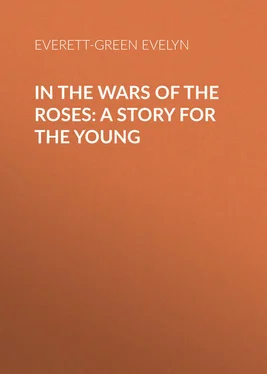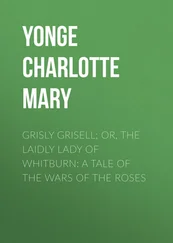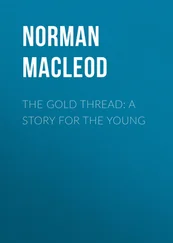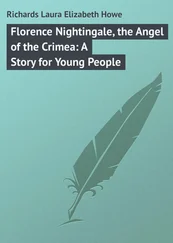Evelyn Everett-Green - In the Wars of the Roses - A Story for the Young
Здесь есть возможность читать онлайн «Evelyn Everett-Green - In the Wars of the Roses - A Story for the Young» — ознакомительный отрывок электронной книги совершенно бесплатно, а после прочтения отрывка купить полную версию. В некоторых случаях можно слушать аудио, скачать через торрент в формате fb2 и присутствует краткое содержание. Жанр: foreign_antique, foreign_prose, на английском языке. Описание произведения, (предисловие) а так же отзывы посетителей доступны на портале библиотеки ЛибКат.
- Название:In the Wars of the Roses: A Story for the Young
- Автор:
- Жанр:
- Год:неизвестен
- ISBN:нет данных
- Рейтинг книги:5 / 5. Голосов: 1
-
Избранное:Добавить в избранное
- Отзывы:
-
Ваша оценка:
- 100
- 1
- 2
- 3
- 4
- 5
In the Wars of the Roses: A Story for the Young: краткое содержание, описание и аннотация
Предлагаем к чтению аннотацию, описание, краткое содержание или предисловие (зависит от того, что написал сам автор книги «In the Wars of the Roses: A Story for the Young»). Если вы не нашли необходимую информацию о книге — напишите в комментариях, мы постараемся отыскать её.
In the Wars of the Roses: A Story for the Young — читать онлайн ознакомительный отрывок
Ниже представлен текст книги, разбитый по страницам. Система сохранения места последней прочитанной страницы, позволяет с удобством читать онлайн бесплатно книгу «In the Wars of the Roses: A Story for the Young», без необходимости каждый раз заново искать на чём Вы остановились. Поставьте закладку, и сможете в любой момент перейти на страницу, на которой закончили чтение.
Интервал:
Закладка:
And then, with a sudden revulsion of feeling, he recollected that he himself wore the cap with the white plume, the jewelled collar of royalty, and the dagger the little prince habitually carried in his girdle. And had he not the same floating golden curls, the same cast of features, the same active figure, and almost the same stature? Might he not save the real prince by playing his part to some purpose for the time being? The men would not distinguish between the pair-he felt certain of that; they would at once make off with their prize. Later on, of course, they would discover the trick, but then the prince would be safe. His own followers would have long since discovered him. Yes, he would do it-he would save the prince at all cost. What did it matter if his own life were the forfeit? The heir of England would be saved.
It was no small act of heroism to which the boy made up his mind in those few moments. Those were lawless days, and human life was held very cheap. The band of fierce men who had believed they were carrying off a prince, would think nothing of running him through with their swords when they discovered how they had been tricked, and that by a mere child. Paul set his teeth hard and braced himself up for the task he had set himself. He knew his peril-he realized it too; but he was a soldier's son, and had he not said he would live and die for the prince? Would he ever be worthy of the knighthood every lad looked forward to as the goal of his ambition, if he shrank now from the task he had set himself?
Hardly had that resolution been taken before there sprang out from the thick underwood two or three fierce-looking men, armed to the teeth.
"Ha, my young springal! well met, in sooth," cried the foremost of the band, laying a firm hand upon the boy's shoulder. "We have been looking long for you.
"To horse, brave fellows! we have our prize. We may not linger here."
"Hands off, varlet!" cried Paul, throwing himself into the character of prince with great energy and goodwill. "Know you to whom you speak-whom ye thus rough handle? Have a care; the Prince of Wales is not thus to be treated."
"Pardon, sweet prince," cried the leader, with ironical courtesy, his grasp not relaxing one whit from the boy's arm. "Time leaves us scant opportunity for the smooth speech of the court. We must use all despatch in conveying your worshipful presence hence, to the safe custody of England's friends.
"Nay, struggle not, boy. We would not harm you. You are safe with us-"
"I know you not. I will not be thus insulted. I will to my royal parents," cried Paul in well-feigned indignation.
But remonstrance and resistance were alike useless. At the sound of a peculiar whistle from one of the party, there immediately appeared some half score of mounted troopers, leading other horses with them. The boy was swung upon the saddle of one of the horses and fastened there by means of thongs, which, although not incommoding him whilst riding, utterly precluded all idea of escape. Moreover the steed was placed between those of two of the stalwart troopers, each of whom kept a hand upon the reins of the supposed prince; and thus, silently but rapidly, the little band threaded the intricacies of the wood, by paths evidently known to them, and ere the dusk had fully come, had cleared the forest altogether, and were galloping steadily and fast across the open country toward the north.
Paul had not spoken another word. He had been in terror lest by some inadvertent phrase he might betray himself, and let those fierce men know that he was not the prince; in which case not only might his own life be forfeit, but the real prince might fall into their hands. But now as the dusk overtook them, and still they were flying farther and farther away from the city where the prince lay, his heart rose, and beat with a generous triumph; for though his own fate might be a speedy death, the heir of England was safe.
It was dark before the lights of a wayside hostelry became visible across the dreary waste they were traversing. The leader of the band turned and addressed a few words to the troopers who had the care of the captive; and at once he felt himself deprived of the tell-tale cap and collar, the former of which was replaced by a cloth cap belonging to one of the men, which almost concealed the boy's features. He was also wrapped in a mantle that further disguised him; and thus they rode up to the inn.
A ruddy stream of light poured out from that comfortable hostelry, and Paul saw, seated on his stout nag, with three of his servants behind him, the well-known figure of a neighbouring farmer, whom business often took to a town many miles from his native place.
The troopers were dismounting and hurrying into the inn. Two only remained with their prize. Paul's resolution was quickly taken. He threw off the encumbering mantle and cap, and cried aloud:
"Gaffer Hood, Gaffer Hood, come and help me! These men have carried me off, and are taking me I know not whither. Come and help me to get free, and my father will richly reward you. They think I am the Prince of Wales, who was playing with me but this afternoon. Tell them who I really am, and they will let me go."
"By the mass, if that be not the voice of little Paul Stukely!" exclaimed the honest farmer in great amazement, as he brought his stout nag alongside the animal that carried the child. The troopers drew their swords as if to interpose (and in those days it was considered better to leave these reckless gentlemen alone when they had booty in their hands, however come by, and no doubt they were in league with the host of the inn); but the character of the dialogue between the farmer and the child was so astounding that the men remained mute and motionless, whilst the leader of the gang, who had heard something of the words, came hurrying to the spot, to see that his prize was safe.
He was quite prepared to make short work of farmer and men alike if there should be any futile attempt at rescue. The man knew his trade, and long habit had made him utterly reckless of human life. But the words he heard exchanged between the child and the farmer held him spellbound, too.
"I was playing with the prince," cried Paul, loud enough for all to hear. "He bid me take his collar and cap and be prince in fantasy, whilst he was my esquire. Afterwards, when he was weary, he lay down to rest, and these fellows caught me and carried me off, thinking I was prince indeed. I would not tell them what they had done, lest they should return and capture him. But bid them loose me now, good Gaffer, and give them all the money in your pouch as my ransom, and I warrant my father will repay you double.
"It is the heir of the House of Lancaster you want, gentlemen, not a poor knight's youngest son, a lad of no account. This good man will pay you some broad gold pieces if you will let me go; but if you are resolved to take my life as the price of my deceit, why, take it now. I am not afraid to die in a good cause, and this worthy man will perchance take home my body to my mother, that it may lie in time beside hers."
"Nay, lad, we will all die ere they shall touch a hair of thy bonny head," cried the honest farmer, signing to his men to come and be ready. "If there's a man in this troop dastard enough to lay a hand upon thee, he shall settle accounts with Gaffer Hood ere he leaves the place. A farmer can fight, ay, and give good strong blows, too.
"Now, gentlemen, which of you will lay hands on that gallant child? for he will have to do it across my dead body first."
"Tush, man, put up thy sword," cried the leader of the band, who, being a man prompt both in action and thought, had taken in the bearings of the situation with great rapidity, and upon whom the simple heroism of the child had not been thrown away.
Rough and self-seeking and cruel as lawless times had made such men, they were not devoid of all better feelings; and although, had there been no interposition on his behalf, Paul might have been a victim to their irritation at being thus duped, as it was his life was now safe enough.
Читать дальшеИнтервал:
Закладка:
Похожие книги на «In the Wars of the Roses: A Story for the Young»
Представляем Вашему вниманию похожие книги на «In the Wars of the Roses: A Story for the Young» списком для выбора. Мы отобрали схожую по названию и смыслу литературу в надежде предоставить читателям больше вариантов отыскать новые, интересные, ещё непрочитанные произведения.
Обсуждение, отзывы о книге «In the Wars of the Roses: A Story for the Young» и просто собственные мнения читателей. Оставьте ваши комментарии, напишите, что Вы думаете о произведении, его смысле или главных героях. Укажите что конкретно понравилось, а что нет, и почему Вы так считаете.












